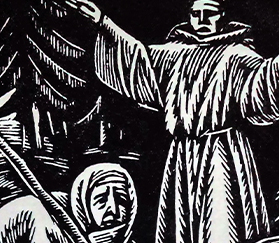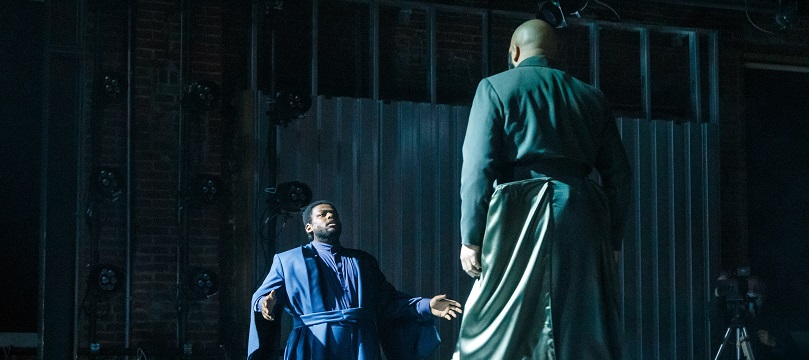A ghost forest in the mountains of Oregon, 1921—the aftermath of a wildfire. We, the audience, are the silent, unseen interlocutor, gathering testimony from seven witnesses—potential perpetrators of a crime.
A woodcutter states that he found a body in the grove, on the mountain where he goes to cut wood. A priest testifies that he passed a man leading a woman on a horse along the Foundry Post Road. A policeman recounts his arrest of Luther Harlow, a local vigilante, who some say is responsible for the spate of women gone missing from the mountain. A woman describes her daughter, Leona, an aspiring botanist, whose new husband, Ambrose, a schoolteacher, appears to have been murdered. The mother pleads with the interlocutor to find the girl, who is missing.
Luther Harlow confesses. Taken by the beauty of a young woman he encountered along the mountain road, he had tried to lure the girl and her husband into a nearby grove, promising treasure. As Luther tells his story, he relives the events: The girl resists Luther’s ruse, but her husband, eager to regale his new bride with pretty trinkets, follows Luther into the grove. Luther quickly disposes of the young man, and when Leona discovers her husband bound and gagged, she pulls a knife on Luther, who wrestles her to the ground, intending to assault the girl. But she slips from his grasp, pelting Luther with a rock, knocking him out just long enough for her to free her husband, arming him with her knife. Ambrose is hesitant at first, but Leona urges him to fight. Although the schoolteacher is no match for the vigilante, he somehow holds his own. Soon enough, however, Ambrose’s strength wanes. Leona intervenes by shooting Ambrose’s rifle into the air, and in the confusion, Luther stabs him, grabs the gun and flees, leaving him for dead.
Leona reluctantly delivers her testimony: of having encountered a dubious man on the mountain road; of her husband Ambrose’s misguided desire to follow the stranger into the grove; of being left to wait alone in the gloam, calling on the relics of the ghost forest for protection. When the man returns without Ambrose, she follows, terrified of what has befallen her husband. In the grove, Luther attempts to assault her, but she eludes him, hurling a stone at him, freeing Ambrose so that he can defend them both. Ambrose hesitates, and she lashes out at him. Ambrose has no choice but to fight a losing battle. Leona again steps in, pointing Ambrose’s rifle to the sky and firing. In the tumult, the marauder disappears, and Leona discovers that her husband is bleeding. She gathers medicinal plants to staunch the wound. But as she tends to Ambrose, he jealously rebukes her, accusing her of having consorted with Luther. Thrown by his anger, she balks, and in that moment he expires. Believing she killed him, she tries, over and over again to take her own life, but fails. Leona confesses that she murdered her husband.
A medium channels the dead man, who articulates the secret Ambrose was never able to tell his new bride—that his heart has always been weak, ever since suffering from rheumatic fever as a small child. The medium and Ambrose relive the incidents leading up to Ambrose’s death from his perspective, tormented by the fact that in his final moments, he allowed his wife to believe it was she who killed him, rather than his failing heart.





 Trailer Video
Trailer Video








